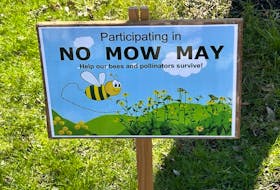ANTIGONISH, N.S. — It’s not the big wall of ice looming in the north of fictional Westeros in Game of Thrones, nor is it the infamous wall along the Mexico border our orange-tinted flaxen-haired neighbour to the immediate south insists upon building, but it has been a source of nearly equivalent dismay: Saltwire’s paywall.
You’ve heard about it. Whether through rumors, watching market trends, or just reading some of the angry comments in Herald articles on Facebook, it’s here and it’s here to stay.
Some of you may have noticed over the last few months that there are some limitations on what you can read, without a subscription on the Chronicle Herald’s website.
The rumors are true, ladies and gents – we’ve locked much of our content into paid subscriptions.
Several of our daily sister publications, including the Cape Breton Post, The Telegram, The Western Star, The Guardian and the Journal Pioneer are now ensconced behind digital barriers prompting readers to subscribe.
Bear with me – it’s not all gloom and doom.
First of all, pretty much anything we create here in this paper will still remain free. The physical copy of the paper is free. That is the case with all of our weekly sister publications.
Of all the most recent paywalls to go up, this new paywall, in this province, only affects the Cape Breton Post.
In anticipation of the paywall, I have had plenty of conversations over dinner, and occasionally over drinks, with people asking about what the implications of locking online content into subscriptions will be.
Specifically, one of the most frequent interjections I hear in those conversations is, “what if people stop reading your stuff?”
I have a problem with that objection; for a couple of reasons. Let me unpackage them.
We – meaning, Saltwire in its entirety, from here to Labrador and eastern New Brunswick – have something valuable to offer.
Something, hopefully, that people will be willing to pay money to read.
Usually, when someone wrings their hands on my behalf, when they hear of an impending paywall, they ask something to the effect of, “what about the stuff that’s free online? Don’t you worry about that kind of stuff – especially when many print journalists are facing layoffs across Canada?”
Yeah, layoffs are bad in this industry. But online-only news makers are not immune to that.
Buzzfeed, one of the most celebrated and extensive internet news purveyors, made famous for its irreverent mingling of idle entertainment and hard news-based strategy of attracting an audience, is also feeling the pressure.
Buzzfeed recently laid off 220 of its employees – most of them writers. No amount of quirky online personality tests and stories about famous peoples’ fashion choices sub-headed with phrases like, “Yas, slay, queen” can ward off the realities of trying to make a living writing about news these days.
Vice Media, that punchy online news with its vulgar panache just removed ten per cent of its staff. Verizon, which owns the Huffington Post, just laid off employees for the popular progressive online news outlet.
As a print journalist, I could take pleasure in watching “those darned online upstarts” painfully learn the realities of our fraught and precarious industry, but I feel little joy watching newer, trendier businesses suffer the same fate as their old-school counterparts.
Those free, online alternatives are hurting, and are not immune to the Facebook and Google’s parasitic siphoning of ad revenue. They’re hurting for the same reason those of us in “legacy media” are hurting. Free online publications, just like their “legacy media” counterparts, are seeing their ad revenue dry up just as quickly.
The market for news and information is an ugly, Darwinian place right now. The most prudent way to deal with this bleak reality is to adapt to those conditions. That, to put it succinctly, is the purpose of paywall. Free news is nice, but in this market, one way or the other, you end up getting what you pay for.
Part of that adaptation process is building a good base from which to keep the whole business afloat. Having paywalls for papers like the Herald and the Post keeps people like us afloat.
In an era where we’re seeing companies like Postmedia and Torstar routinely trading and shutting down entire newspapers in Ontario and BC, we small publications – beneficiaries of the paywalls that the Herald and Post now have – bring something to the table that is quickly becoming a rare commodity, in small town Canada; reliable community news.
I’m certain that you won’t get anything reliable, accurate or up-to-date about the gold mines they’re trying to open in Guysborough County or St. Mary’s, or on the Northern Pulp/Boat Harbour saga from Buzzfeed’s Toronto bureau, or some blog about Canadian politics.
Even when CBC sends someone down from their ivory towers to cover rural Nova Scotian issues, they’re usually just chasing after stories we’ve already reported on.
Most online-only journalism, to be pretty blunt about it, doesn’t know or care about what goes on in the world outside of major urban centers. It’s rootless babble, and entirely disconnected form the communities it purports to serve.
Online “legacy media” journalism, like the stuff you can find our website, is rooted in the community. Clearly some adaptations were necessary, but I guarantee we care more about what goes on here, than some oblivious yuppie working for an online upstart or some blogger to whom political objectivity is a foreign concept.
Canadian blogs like Narcity can barely point to where Halifax is on a map – are you going to trust them, a still-free publication to be fact-checking anything about us here in wee little Antigonish, when they routinely write stories that are poorly researched, or just flat-out fatuous?
A lot of what is still free is hardly up to snuff. It’s hard for me to feel that we have stiff competition when I click into an article on the ever-popular Business Insider about 96-year-old Nobel Prize winner, a man who is revolutionizing solar technology in his basement, and has inventions like light tweezers and a malaria test credited to his intelligence, and the reporter who spoke to him opened a story about him with an anecdote about what he was wearing.
Also, now that any doofus with a free Wordpress account can crack open a browser window, write whatever they want and pass it off as news, there’s something to be said for authenticity.
We, not to toot our own horns too much, are able to provide that authenticity. I’d like to think people who read our content understand that and will be discerning enough to appreciate what we’re bringing to the table.
I know for a fact there are a lot of people out there with good taste who are reading the Herald and the Post and liking what they see.









